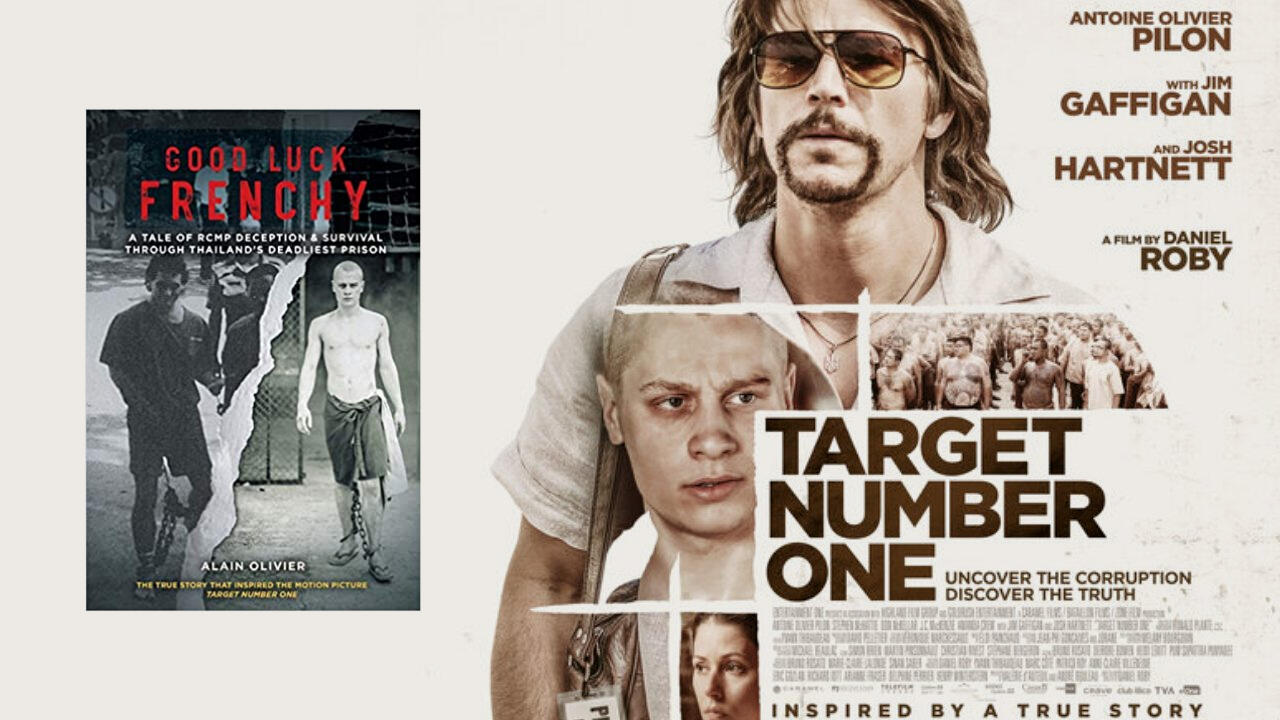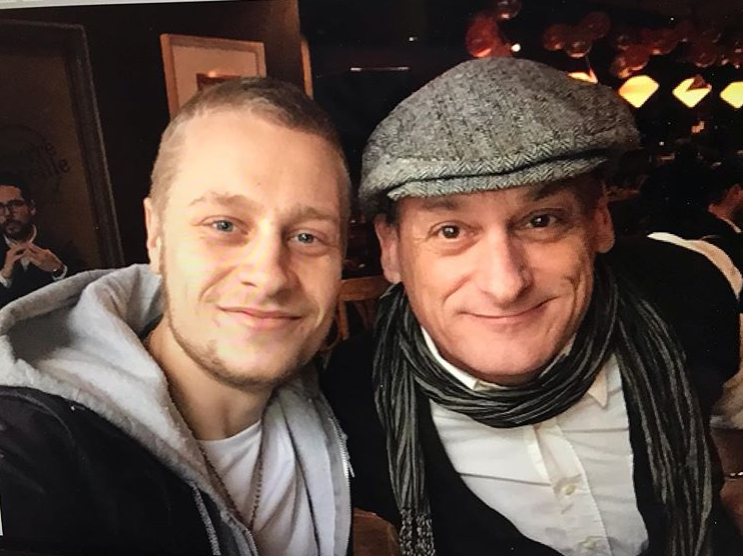Target Number One: Author Alain Olivier’s On A Mission For Justice
/Alain Olivier spent an unfathomable eight and a half years in Thailand’s infamous Bang Kwang prison, where he faced the death penalty for the first 42 months. Alain says that if not for an investigation by journalist Victor Malarek, he may never have returned to Canada or been able to tell his side of his harrowing story.
And tell it he did: self-published through FriesenPress, Good Luck Frenchy is Alain’s story, presented entirely in his words for the first time. Drawing from his prison diary, press materials, and court documents, Good Luck Frenchy is Alain’s chilling recounting of the dramatic undercover operation that led to him being subjected to the death penalty in Thailand – and the alleged cover-up that followed.
Alain’s story is the stuff great movies are made of: an ultimately redemptive tale of survival, injustice, and corruption that spanned the globe and played out in slow-motion over the last 30+ years. It’s little surprise that Hollywood came calling.
The feature film Target Number One (titled Most Wanted in the US), starring Antoine Olivier Pilon and Josh Hartnett, is inspired by Alain’s real-life experiences in Thailand and its resulting fallout. Originally scheduled for release in April, the movie is now playing on over 100 screens across Canada with wide release across the United States on July 24th.
Alain took time away from his first press junket (and writing the sequel to Good Luck Frenchy) to speak with us about Target Number One, how the book and film came to be, and what drives his mission.
Alain – congratulations are in order for both the film and the publication of Good Luck Frenchy. How does it feel to know that your story is about to reach such a massive audience?
A lot of emotions. There’s a lot of excitement that keeps growing day after day. [I have] friends in Vancouver, Montreal, and other places across Canada who saw the movie trailer when they went to see a movie in their town (pre-COVID). They were advertising [Target Number One] and the big poster was already at the door of the cinema and everything. It’s pretty special to hear people give feedback about it – especially after having spent so many years on my own trying to work this out and win a fight for the truth, because I know the truth will not change no matter how many years go by. The truth remains the truth.
How did this opportunity come about? Is it something you were approached about or did you pursue it?
It has been almost 14 years since we started talking about [this film]. A few days before the trial in my civil suit against the RCMP and the Attorney General of Canada, there was a movie director here in Montreal who called one of my lawyers and wanted to meet me. It was Daniel Roby. After some talk together, he decided to come down for the whole duration of the trial. He spent three months sitting in court listening to the testimonies. He saw what was happening when all the truth was ignored, so he decided to write a movie based on this situation. That’s what inspired the plot of the movie.
Victor Malarek – who is also, incidentally, a FriesenPress author – plays a massive part in your story. What’s your relationship with Victor? How did Victor connect you with FriesenPress?
I’ve considered Victor a friend since the first day he visited me in Thailand in 1989, and he is a big, big part of this story. He’s the one who basically brought me back to Canada from Thailand. In 1996, Victor wrote about my mistreatment in his book Gut Instinct. The whole story soon ended up before Parliament, which led to me being brought back to Canada. He’s been there for me through everything, and he’s a big reason why I’m here today. His encouragement is also a big reason I was able to finish writing and eventually publish this book. When you’re on your own and never have anyone to encourage you to go on at some point, it’s pretty hard to keep any type of discipline. But once you know someone cares, it helps you to keep going. And when Victor said he would write the preface of the book, that gave me another reason to make it as good and as accurate as possible, because he’s going to have his name associated with it.Victor knows the story. He knows the documentation. So, to have him read and compliment the book brought some tears to my eyes. He’s a special man and someone I admire very, very much.
Describe the writing and publishing processes of Good Luck Frenchy.
Sometimes you almost feel like you’re in a monastery and working on your own for years and years, waiting to emerge as a Buddhist monk. I was mid-way through writing and I wrote to [Victor] and I told him “I don’t think I’m made to write a book”. He kind of pushed me a little bit. It was a little kick in the ass. And I just threw open my computer and I started down the path of completing the rest of the book. I had to retrace all the court documents from over the years and make sure that the contents were exactly what would be in the book — dates and names and everything. There’s no margin for error when it concerns the RCMP and the government.
Because, believe me, writing a 500-page book like I’ve done, it’s exposing everything about myself. If it was about my drug addiction, I left nothing behind. But it’s a long process. I’m a forest ranger by training, so to write a book...I had to learn. It’s been a lot of work but all the reasons why I’ve [written this book] were good reasons.
Publishing the book was a good process — it was like going to school, and I’m still learning. Once I have a connection with someone like [FriesenPress Promotions Specialist] James, who knows about book marketing, it makes my work much easier and it takes a lot of stress from me. When you don’t know if you’re right or you’re wrong, it’s not easy. But once experts are telling you “yes, that’s good,” it’s really comforting and at some point you start to feel more secure about everything [laughs].
What mission are you on with this book and the film?
This whole project is about human rights. It’s about ensuring that all generations to come—your kids and the kids of your kids—will be entitled to have a justice system that is fair. There are good people behind this whole project who will be able to explain the purpose behind all that — I’m looking more at people like Victor Malarek and the director and many, many other people who are not imbeciles. They know the law, they know about justice, they know what is fact and what are lies. They can make a difference. They see everything that had been covered up years ago, which makes it even more special for me to see that [the truth] is coming out now in a way it wasn’t before. And I’m confident that all Canadian viewers will be, just like the readers of the book, touched by what they see and hear.
I understand that you were on set during filming – what was it like seeing your life story come to life as a feature film? Was there anything surprising about the process?
Antoine Olivier Pilon (left) plays a character based on Alain Olivier (right) in Target Number One.
I was on set for about 70% of the shoot – except for Thailand, where I couldn’t go. I took about 6,000 pictures on set with all the actors and the crew. I almost felt like a kid, you know, when [shooting started] after all those years.
What surprised me was the genius of the movie director to do so much with so little. We didn’t have a big, big budget. But the thing I love about [Daniel] is that he’s as resilient as I am. When he starts something he wants to finish it off and he proved that very well with this movie. And the friendship that [Daniel and I] developed over the years helped a lot. The movie was originally supposed to be shot in 2009 or 2010 but then it didn’t happen. In many ways, it’s better that it didn’t happen back then, just in terms of maturity from the movie director, and even all the people working on set.
Have you seen the film? What did you think of Target Number One?
The movie is just a crescendo from the first scene to the last. The actors are amazing and the director of photography on the movie is absolutely incredible. So is the music. When I saw the first images of the movie, of [Antoine-Olivier Pilon] with chains around his ankles, believe me, that just got me down. I wore chains for 42 months, and when you’re seeing it like this, years down the line… It’s very touching. And after the comments that we’ve had from people on the crew and a few others who were able to see the movie with us before Christmas, I think the reaction speaks for itself. Victor was with us and he couldn’t speak to anyone after the movie because he was too choked up – just like me. And with the way that Daniel directed this movie, just to see the final product after all that time – it’s something. There’s not many people writing books, and there are even less people who are having movies made about them. I think it’s a good return from life.
###
Target Number One is now playing on over 100 screens in Canada, with wide release across the United States to follow on July 24th. Good Luck Frenchy is available now on the FriesenPress Bookstore.













